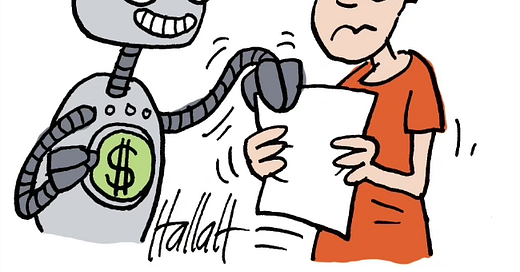Cartooning in the Age of AI #19: We'll Need Multiple Sources of Income
Government sees artificial intelligence as an economic saviour. It is unlikely to protect human creativity and the income that brings.
Cartooning wasn’t an easy way to make a living before generative AI came along.
Now we’re going to have to get smarter.
And more human.
The UK Government loves AI
Copyright infringement cases continue against generative artificial intelligence companies. Stability AI claims that Getty’s case poses an “existential threat” to their business. That’s right: AI companies who stole creative work to train their models say they will go out of business if they have to pay for it. They should pay something to creators, and governments should put in a legal framework for this to happen. But governments see more money coming from AI than from the creators who helped train them.
The UK government is insistent that AI will be good for the economy and bring loads of jobs, which is why we need more data centres (together with the power and water those centres need). The UK economy certainly needs help—it's been carrying massive debt following the 2008 crash and the fallout from Brexit, not to mention Covid.
But will AI actually add money to the government coffers? As well as the inevitable tax breaks for the data centre building, the added energy demands have to be met somehow. This week, the UK government announced that it will be pressing ahead with Sizewell C, a nuclear power station in southeast England. That’s expensive, even if you don’t consider the cost of nuclear waste disposal.
Will AI and its power use create long-term jobs?
I don’t know.
What we can be certain of is that AI is accelerating the loss of jobs in creative industries. We need to replace that income if we are to continue creating. And we need to speak up about the inequity of AI companies making money on our work without compensating us for it.
AI will be an important part of our economy, but so is creativity and I'd like to see the government propose how it will protect intellectual property and ensure compensation when that IP is used by AI companies.
I shared this cartoon last year, but given that many of you are new to this newsletter and my work, I thought it pertinent to share again.
Making a cartooning living in the age of AI
So how do cartoonists replace income lost to AI? This is something I'm going to have to grapple with as I settle back in England. Most of my income comes from Arctic Circle, my environmental comic which is syndicated to newspapers. AI is an existential threat to newspapers.
The internet and social media changed how people got their news and many papers failed in those online spaces. And many comic strips have failed in turn. Surviving newspaper websites and are losing views to AI searches (which show newspaper content without the reader needing to click through). The writing has been on the wall for decades, but now it is in big, block letters (probably in Comic Sans).
Once I’m settled into my own home (I’ve had an offer accepted, but now there are searches and surveys: fingers crossed on those!), I will be working on more illustrated books and planning more in person events.
In the meantime, I had an amazing response to last week's newsletter. Creative people, unlike AI, can build real community, and communities support each other. Lots of people bought me a coffee and Molly a treat (There were definitely more treats for Molly 😉). Plus, I gained more subscribers to this newsletter.
Most current newsletters will continue to be free (older newletters are paywalled). I share more material on the epistle member’s page with the kind people who become paid subscribers. And I’m also grateful to those who share my posts, buy my books and leave lovely reviews. A supportive community helps me stand up to the robots.
Thank you for being one of the good humans.
Alex
P.S. I took Molly to the vet physiotherapist. She spent two and a half hours with us and charged us less than a visit to the vet. She observed Molly moving, took a detailed history, examined her, and diagnosed sciatica in addition to the hip dysplasia. She gave her a massage and then used electrotherapy, which I should be able to do at home once the TENS gadget arrives.
The visit was illuminating. Vets are like GPs—they often only have the time to diagnose and prescribe without getting to the root of problems. It pains me to think that Molly has been suffering for a long time. The physio said that reactive dogs are often guarding themselves because of pain. Hopefully we can do something about that now.
Unfortunately, the acute pain has to be managed by:
a) no swimming,
b) no trips to the beach, and
c) no ball play.
Just ordinary walks for two weeks. Molly will not be impressed. But it is a small price to pay if it means less pain.
"A New Zealand Diary: Living in Lyttelton", an illustrated, non-AI-generated memoir, is available where all good books are sold and in Christchurch Libraries (where it’s free to place a hold)
“Alex Hallatt has made a little masterpiece of a book” – Librarian from Tūranga, Christchurch
If you want your library to get a copy, ask them.
Also locally available at Leslie’s Bookshop in Lyttelton.
And if you like the book, please let people know.
Book details, a sample chapter and more information are at alexhallatt.com/nzd












Best wishes for Molly's complete healing and no pain and more playing and walks. Great post, as always. AI is a giant to be outfoxed, from where I sit.
Sending positive and (((HEALING))) energy.
Meanwhile, carve a path AI can't mirror. Do what doesn't make sense.